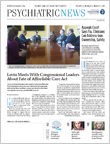“While individualized precision medicine is an important national goal, we will evaluate whether there are sufficient data to warrant clinical implementation of [genetic] testing.”
New science can mean new ways of looking at mental illness and new approaches to care. Experts in two debates at APA’s Annual Meeting in San Diego will argue the merits of the use of genetic data to inform treatment decisions and how the gut microbiome influences mental health and illness.
“The goal of these debates is to develop a tool to teach research literacy to psychiatrists,” said Erika Nurmi, M.D., Ph.D., an assistant professor of psychiatry and biobehavioral sciences at the University of California, Los Angeles, who is coordinating the sessions. “We use an expert-debate format to guide our audience in examining the research literature to see if it’s clinically actionable.”
Last year’s debate focused on how drugs of abuse—such as ketamine and cannabis—had come into clinical use, perhaps ahead of the evidence. Using an electronic audience response system, more than half of the 200 attendees rated their training in research literacy as poor or nonexistent. Only 25 percent said they could identify the limitations of most research reports and evaluate whether findings were clinically actionable. Also, 66 percent admitted relying solely on review articles, conferences, and practice guidelines to keep their practices up to date.
The first debate, titled “Should I Be Using Genetic Testing to Guide Prescribing?,” will explore the extent to which genetic information can be useful in choosing and prescribing medications.
Nurmi, a practicing psychiatrist whose Ph.D. is in genetics, explained that the sessions will explore two instances where preclinical genetic data have been rapidly translated to clinical use, largely from direct-to-consumer marketing.
As genetic testing continues to become faster and cheaper, the number of people accessing genetic information through direct-to-consumer testing is on the rise. Psychiatrists must be prepared to understand and manage that information.
“While individualized precision medicine is an important national goal, we will evaluate whether there are sufficient data to warrant clinical implementation of [genetic] testing; whether impact to outcomes is clinically meaningful; and whether the health care field is prepared to understand, explain, and respond to information provided,” Nurmi told Psychiatric News.
The main presenter will be James Kennedy, M.D., a professor of psychiatry and head of the Tanenbaum Centre for Pharmacogenetics at Toronto’s Center for Addiction and Mental Health. He will be joined by panelists James McCracken, M.D., a professor of child psychiatry and director of the Division of Child and Adolescent Psychiatry at the University of California, Los Angeles, NPI-Semel Institute; Michele Pato, M.D., a clinical professor of psychiatry and behavioral sciences at the Keck School of Medicine of the University of Southern California; and Chadi Calarge, M.D., an associate professor of psychiatry and behavioral sciences at Baylor College of Medicine in Houston.
In the second debate, experts will examine the burgeoning field of neurogastroenterology in the session “Can Gut Microbes Affect Mental Illness?”
The complex interactions between the digestive and nervous systems has received much attention both in the professional literature and among the public. The ability to profile the gut microbiome using genetic microbial signatures has stimulated a growing appreciation among researchers of the interdependence of the microbiota and the host in neurodevelopment, inflammation, stress response, and more.
“While our understanding of the impact of gut microbes on the development and treatment of mental illness remains limited, patients commonly turn to natural diet or probiotic approaches over evidence-based treatments,” said Nurmi. “Patients like that idea because it’s easy to modify the diet or consume probiotics, but the connection of the gut microbiome to the brain is much more complex than people realize.”
Ted Dinan, M.D., Ph.D., a professor of psychiatry at University College Cork in Ireland, will present on this specialty, and McCracken, Pato, and Calarge will again lead discussion on the topic.
The structure of the sessions will be highly interactive, said Nurmi. Members of the audience will use their smartphones to download slides, ask questions during the session, and respond to polling questions. ■
“Should I Be Using Genetic Testing to Guide Prescribing?” will be held Monday, May 22, 1:30 p.m. to 3 p.m. “Can Gut Microbes Affect Mental Illness?” will be held Monday, May 22, 3:30 p.m. to 5 p.m. Both debates will be held in the San Diego Convention Center.

